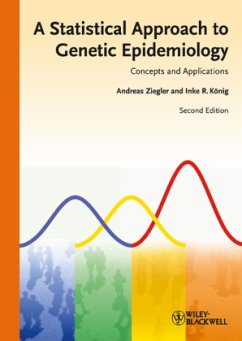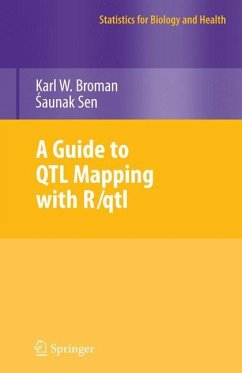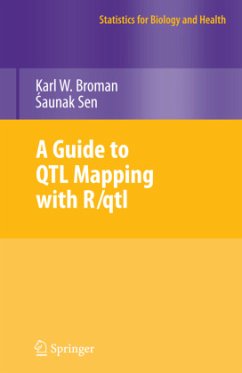
Forward-Time Population Genetics
Versandkostenfrei!
Versandfertig in über 4 Wochen
112,99 €
inkl. MwSt.
Weitere Ausgaben:

PAYBACK Punkte
56 °P sammeln!
The rapid increase of the power of personal computers has led to the use of serious simulation programs such as easy POP in genetic studies. This book summarizes recent advances in forward-time simulation methods and demonstrates their applications in population genetics and genetic epidemiology. The authors introduce commonly used forward-time population genetics simulation methods, including some new methods, and introduce a forward-time population genetics simulation environment, simuPOP, as a powerful and flexible tool to implement these simulations. Researchers and students in population and statistical genetics will find this book useful.
The only book available in the area of forward-time population genetics simulations--applicable to both biomedical and evolutionary studies
The rapid increase of the power of personal computers has led to the use of serious forward-time simulation programs in genetic studies. Forward-Time Population Genetics Simulations presents both new and commonly used methods, and introduces simuPOP, a powerful and flexible new program that can be used to simulate arbitrary evolutionary processes with unique features like customized chromosome types, arbitrary nonrandom mating schemes, virtual subpopulations, information fields, and Python operators.
The book begins with an overview of important concepts and models, then goes on to show how simuPOP can simulate a number of standard population genetics models--with the goal of demonstrating the impact of genetic factors such as mutation, selection, and recombination on standard Wright-Fisher models. The rest of the book is devoted to applications of forward-time simulations in various research topics.
Forward-Time Population Genetics Simulations includes:
An overview of currently available forward-time simulation methods, their advantages, and shortcomings
An overview and evaluation of currently available software
A simuPOP tutorial
Applications in population genetics
Applications in genetic epidemiology, statistical genetics, and mapping complex human diseases
The only book of its kind in the field today, Forward-Time Population Genetics Simulations will appeal to researchers and students of population and statistical genetics.
The rapid increase of the power of personal computers has led to the use of serious forward-time simulation programs in genetic studies. Forward-Time Population Genetics Simulations presents both new and commonly used methods, and introduces simuPOP, a powerful and flexible new program that can be used to simulate arbitrary evolutionary processes with unique features like customized chromosome types, arbitrary nonrandom mating schemes, virtual subpopulations, information fields, and Python operators.
The book begins with an overview of important concepts and models, then goes on to show how simuPOP can simulate a number of standard population genetics models--with the goal of demonstrating the impact of genetic factors such as mutation, selection, and recombination on standard Wright-Fisher models. The rest of the book is devoted to applications of forward-time simulations in various research topics.
Forward-Time Population Genetics Simulations includes:
An overview of currently available forward-time simulation methods, their advantages, and shortcomings
An overview and evaluation of currently available software
A simuPOP tutorial
Applications in population genetics
Applications in genetic epidemiology, statistical genetics, and mapping complex human diseases
The only book of its kind in the field today, Forward-Time Population Genetics Simulations will appeal to researchers and students of population and statistical genetics.












